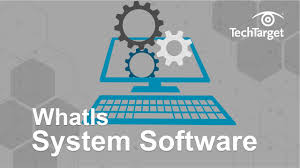The Importance of Software Systems in Today’s Business Environment
In today’s fast-paced and highly competitive business environment, the role of software systems has become more crucial than ever before. Software systems play a vital role in helping businesses streamline their operations, improve efficiency, and stay ahead of the competition.
One of the key advantages of software systems is automation. By implementing software systems, businesses can automate repetitive tasks, reducing the risk of human error and freeing up employees to focus on more strategic activities. This not only improves productivity but also enhances the overall quality of work.
Software systems also facilitate better decision-making. With the help of data analytics and reporting features, businesses can gain valuable insights into their operations, customer behaviour, and market trends. This data-driven approach enables businesses to make informed decisions quickly and effectively.
Furthermore, software systems enhance collaboration and communication within an organisation. With features such as cloud-based storage, real-time messaging, and project management tools, employees can work together seamlessly regardless of their physical location. This promotes teamwork and ensures that everyone is on the same page.
Security is another critical aspect where software systems excel. In today’s digital age where cyber threats are prevalent, having robust security measures in place is essential. Software systems offer various security features such as encryption, access controls, and regular updates to protect sensitive data from breaches.
Overall, software systems have become indispensable tools for modern businesses looking to stay competitive and agile in a rapidly evolving landscape. By investing in reliable software systems tailored to their specific needs, businesses can unlock new opportunities for growth, innovation, and success.
Understanding Software Systems: Key Questions Answered
- What is a software system?
- How does a software system work?
- What are the benefits of using a software system?
- What are the different types of software systems available?
- How can a business choose the right software system for their needs?
What is a software system?
A software system is a comprehensive set of programs, procedures, and documentation that performs specific tasks on a computer or computing device. It encompasses both the software applications that users interact with directly and the underlying infrastructure that supports their operation. Essentially, a software system is designed to provide solutions to various business or operational needs by processing data, executing tasks, and facilitating communication within an organisation. It acts as the backbone of modern technology-driven operations, enabling businesses to automate processes, manage information effectively, and make informed decisions based on data analysis. In essence, a software system is the foundation upon which digital tools and applications are built to support and enhance organisational functions.
How does a software system work?
A software system functions as a set of interconnected programs and processes designed to perform specific tasks and operations on a computer or network. It works by executing instructions and commands to manipulate data, interact with users, and manage resources effectively. At its core, a software system relies on algorithms and logic to process input data, produce output results, and facilitate communication between different components. By following predefined rules and structures, a software system can automate tasks, solve problems, and enable users to achieve their desired goals efficiently. The seamless integration of various modules within a software system ensures that it operates cohesively to deliver the intended functionality and meet the needs of its users.
What are the benefits of using a software system?
There are numerous benefits to using a software system in today’s business environment. Firstly, software systems enable automation of tasks, enhancing efficiency and reducing the likelihood of human error. Additionally, software systems provide valuable data analytics and reporting capabilities, empowering businesses to make informed decisions swiftly. Improved collaboration and communication among team members are also facilitated by software systems, fostering a more cohesive work environment. Furthermore, robust security features offered by software systems help safeguard sensitive data from cyber threats, ensuring the protection of valuable information. Overall, the adoption of a software system can lead to increased productivity, streamlined operations, and enhanced competitiveness for businesses in various industries.
What are the different types of software systems available?
When considering the different types of software systems available, it’s important to note the diverse range of solutions that cater to various needs and functions. Some common types include operating systems, which serve as the foundation for computer operations; application software, such as word processors and web browsers, designed for specific tasks; enterprise resource planning (ERP) systems that integrate business processes across departments; customer relationship management (CRM) software for managing interactions with customers; and content management systems (CMS) for creating and managing digital content. Each type of software system serves a distinct purpose and plays a crucial role in enhancing efficiency and productivity in different contexts.
How can a business choose the right software system for their needs?
When it comes to selecting the right software system for their needs, businesses should follow a systematic approach to ensure they make an informed decision. Firstly, it is crucial for businesses to clearly define their requirements and objectives. By understanding their specific needs, such as scalability, integration capabilities, and user-friendliness, businesses can narrow down their options and focus on software systems that align with their goals. Additionally, conducting thorough research on different software vendors, reading reviews, and seeking recommendations from industry peers can provide valuable insights into the reliability and performance of various systems. It is also essential for businesses to consider factors such as budget constraints, implementation timelines, and post-implementation support before making a final decision. By taking these steps and evaluating software systems based on their unique criteria, businesses can choose a solution that best fits their requirements and sets them up for success in the long run.

